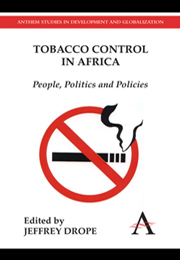Book contents
- Frontmatter
- Contents
- List of Figures and Tables
- Foreword
- Preface
- Acknowledgments
- List of Abbreviations and Acronyms
- 1 Introduction
- 2 The Political Mapping Process
- 3 Progress on Smoke-Free Policies
- 4 Taxation as a Tobacco Control Strategy
- 5 The Challenges of Implementing Bans on Advertising, Promotion and Sponsorship
- 6 The Pursuit of Packaging and Labeling Requirements
- 7 Burkina Faso
- 8 Cameroon
- 9 Eritrea
- 10 Ghana
- 11 Kenya
- 12 Malawi
- 13 Mauritius
- 14 Nigeria
- 15 Senegal
- 16 South Africa
- 17 Tanzania
- 18 Zambia
- 19 Conclusion: Tobacco Control in Africa – People, Politics and Policies
- Notes on Contributors
- Index
1 - Introduction
Published online by Cambridge University Press: 05 March 2012
- Frontmatter
- Contents
- List of Figures and Tables
- Foreword
- Preface
- Acknowledgments
- List of Abbreviations and Acronyms
- 1 Introduction
- 2 The Political Mapping Process
- 3 Progress on Smoke-Free Policies
- 4 Taxation as a Tobacco Control Strategy
- 5 The Challenges of Implementing Bans on Advertising, Promotion and Sponsorship
- 6 The Pursuit of Packaging and Labeling Requirements
- 7 Burkina Faso
- 8 Cameroon
- 9 Eritrea
- 10 Ghana
- 11 Kenya
- 12 Malawi
- 13 Mauritius
- 14 Nigeria
- 15 Senegal
- 16 South Africa
- 17 Tanzania
- 18 Zambia
- 19 Conclusion: Tobacco Control in Africa – People, Politics and Policies
- Notes on Contributors
- Index
Summary
The harmful effects of tobacco use pose an imminent threat to the health of African people. As the tobacco epidemic shows signs of waning in some northern countries, a combination of factors such as low prevalence rates, young and burgeoning populations, growing disposable incomes and aggressive and unscrupulous advertising by multinational tobacco companies threatens to create a massive tobacco-related burden of disease in Africa, which will unfortunately add to existing public health challenges. The World Health Organization (WHO) reports that tobacco kills approximately 5.4 million people annually, which is more than HIV/AIDS, malaria or tuberculosis. More than half of these tobacco-related deaths are now in developing countries. Fortunately, in recent years, proponents of tobacco control have increased their efforts in Africa and there is now some notable progress in policy reform. However, a great deal of work remains. Moreover, more country-specific or locally relevant research in Africa and across developing countries is necessary to complement these nascent efforts. While the research must be theoretical and empirical, it must also be highly relevant, accessible and useable by advocates of policy change.
Accordingly, the principal focus of this research is to examine the political, economic and social determinants of policy change in the area of public health generally and tobacco control more specifically. The research in the book is based on the 2008–10 African Tobacco Situational Analyses (ATSA) initiative, which was spearheaded by the International Development Research Centre's (IDRC) Research for International Tobacco Control (RITC) with funds from the Bill and Melinda Gates Foundation.
- Type
- Chapter
- Information
- Tobacco Control in AfricaPeople, Politics and Policies, pp. 1 - 12Publisher: Anthem PressPrint publication year: 2011
- 1
- Cited by

